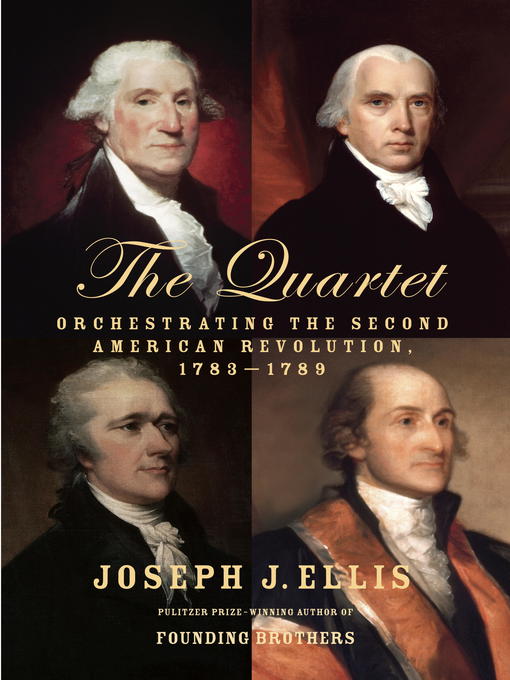
The Quartet
Orchestrating the Second American Revolution, 1783-1789
کتاب های مرتبط
- اطلاعات
- نقد و بررسی
- دیدگاه کاربران
نقد و بررسی

February 23, 2015
Few can tell a historical tale as well as Ellis, as many readers will be aware from his eight previous studies of the Revolutionary War era (Revolutionary Summer, etc.). True to form, here he reviews this short but important time in America’s history through the eyes of its major figures—George Washington, Alexander Hamilton, John Jay, and James Madison—rather than offering an analysis of the weighty interval between the nation’s failed first constitution, the Articles of Confederation, and the ratification of the second (and successful) constitution and its first 10 amendments, which we now know as the Bill of Rights. Ellis’s approach employs deft characterizations and insights into these politicians and philosophers, who bested their opponents by “imposing their more expansive definition of the American Revolution” on the American people. With his usual skill, Ellis brings alive what otherwise might seem dry constitutional debates, with apt quotations and bright style. There may be equally solid surveys of “the second American Revolution,” a term Ellis borrows from other historians, but this one will be
considered the standard work on its subject for years to come. It lacks the fresh interpretations and almost lyrical prose of Ellis’s previous books, but it’s a readable, authoritative work. Agent: Ike Williams; Kneerim, Williams & Bloom.

Starred review from January 1, 2015
A brilliant account of six years during which four Founding Fathers, "in disregard of public opinion, carried the American story in a new direction."In a virtuosic introduction, Pulitzer Prize and National Book Award winner Ellis (Revolutionary Summer: The Birth of American Independence, 2013, etc.) maintains that Abraham Lincoln was wrong. In 1776-four score and seven years before 1863-our forefathers did not bring forth a new nation. American revolutionaries hated distant governments, taxes, armies and inconvenient laws. Their Colonial governments seemed fine. Ellis reminds us that the 1776 resolution declaring independence described 13 "free and independent states." Adopting the Constitution in 1789 created the United States, but no mobs rampaged in its favor. In fact, writes the author, the "vast majority of citizens had no interest in American nationhood, indeed regarded the very idea of national government as irrelevant to their love lives." Ellis delivers a convincing argument that it was a massive political transformation led by men with impeccable revolutionary credentials. The indispensable man was George Washington, whose miserable eight years begging support for the Revolutionary army convinced him that America needed a central government. Its intellectual mastermind, James Madison, not only marshaled historical arguments, but performed political legerdemain in setting the Constitutional Convention agenda, orchestrating the debates and promoting ratification. Less tactful but equally brilliant, Alexander Hamilton's vision of American hegemony would provoke stubborn opposition, but during the 1780s, the people that mattered had no objection. An undeservedly neglected Founding Father (Thomas Jefferson became our first secretary of state only after he declined), John Jay was close to the others and a vigorous advocate of reform. This is Ellis' ninth consecutive history of the Revolutionary War era and yet another winner.
COPYRIGHT(2015) Kirkus Reviews, ALL RIGHTS RESERVED.

December 1, 2014
Winner of a Pulitzer Prize and a National Book Award for Founding Brothers and American Sphinx, respectively, Ellis moves beyond the Revolutionary years to the "second American Revolution," when the Colonies agreed to submit to a federal government. Four men stand out in his account--George Washington, Alexander Hamilton, John Jay, and James Madison.
Copyright 2014 Library Journal, LLC Used with permission.

























دیدگاه کاربران